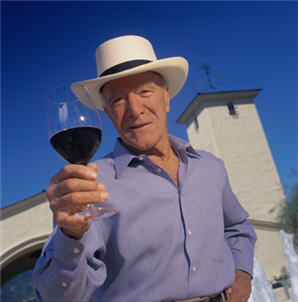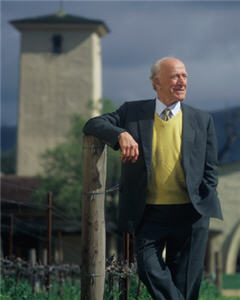

Here's a toast to Robert Mondavi, the likes of whom we may never see again.
There’s no icon like Robert Mondavi
But who is there to continue his American wine vision?
by
Alan Goldfarb
May 6, 2008
 azing on the indescribable blue of the infinite Sea of Cortez at the southern tip of North America moves me to contemplate a bit. Among the many thoughts that the petty pace of a vacation allows is the noticeable void in the world of wine. The notion comes to me as I take a sip of a delicious Viognier made in the Guadalupe Valley of Baja, California, just as a gigantic wave crashes onto the beach a hundred yards away, which incredibly rocks the villa where I’m staying.
azing on the indescribable blue of the infinite Sea of Cortez at the southern tip of North America moves me to contemplate a bit. Among the many thoughts that the petty pace of a vacation allows is the noticeable void in the world of wine. The notion comes to me as I take a sip of a delicious Viognier made in the Guadalupe Valley of Baja, California, just as a gigantic wave crashes onto the beach a hundred yards away, which incredibly rocks the villa where I’m staying.
Who, I think, is there left among us to inspire with passion and move us with their wisdom to go and make a truly great wine or even to drink a wine so definitive that it has been embedded into our memory?
 It came to me just then that we haven’t heard Robert Mondavi speak words of wisdom for what seems forever. In reality, of course - as we’re subsumed with war, gas prices, and primaries – it has been only a few short years.
It came to me just then that we haven’t heard Robert Mondavi speak words of wisdom for what seems forever. In reality, of course - as we’re subsumed with war, gas prices, and primaries – it has been only a few short years.
I call Mondavi the godfather of California wine because of his vision and energy that began more than three decades ago as he attempted to create an American wine culture. Mondavi, who will be 95 in June, is still with us. But confined to a wheelchair, and hardly able to speak, his once powerful and awe-inspiring messages have been silenced.
He would tell anyone who would listen that, like the Europeans, we, too, can learn to appreciate wine and food and art. More than 30 years later, he has been proven right. At last, Americans indeed are embracing wine as never before. There are wine bars erected, seemingly almost everyday on every street corner. There are wine blogs all over the Internet, and there’s more wine being produced and bought than ever before in our history.
We owe much of it to Robert Mondavi.
He inspired one generation of American winemakers to make good, clean wines of balance; wisdom that has been passed onto the current iteration of
 winemakers, who are producing their own interpretation of wine. And he got his message across to consumers, who listened to him and read his words, and went out and began tasting wine. Their daughters and sons got the message too, and have taken it farther, experimenting with international varieties, and enjoying wines that are bigger and fruitier than any made in the world before.
winemakers, who are producing their own interpretation of wine. And he got his message across to consumers, who listened to him and read his words, and went out and began tasting wine. Their daughters and sons got the message too, and have taken it farther, experimenting with international varieties, and enjoying wines that are bigger and fruitier than any made in the world before.
But who is there now to impart vision and wisdom and inspiration as we wend our way through a period of prosperity in the wine business that is likely to be froth with obstacles due to impending economic and climatic hardships? Who will guide us as we tiptoe between Old World and New World wines; and keep us from falling into the abyss of disparity?
André Tchelistcheff, the patriarch of California wine, single-handedly inspired untold numbers of growers and winemakers beginning in the 1940s. But he was a winemaker’s winemaker, who rarely touched the imagination of the consumer.
The Gallo brothers, who inspired an earlier generation of winemakers, adapted their cellar methods to produce large lots of wine but suffered the ignoble reputation of producing jug wines.
Jess Jackson was most responsible for moving Americans up from white Zinfandel to Chardonnay, albeit a sweet version that wildly appealed to American tastes then. But Jackson, who has been incredibly successful with his Kendall-Jackson brand, never came close to reaching the sage-status of Mondavi.
(The Trinchero family of Sutter Home, by the way, deserve a mention here for their ingenious creation of rosé of Zin, which moved wine along the continuum. But their legacy with the public unfortunately will go down as but a footnote.)
Fred Franzia? No one has sold so much wine (Two Buck Chuck) for so cheaply, in the history of the U.S. But is he an inspiration to anyone other than as a model for commercialism?
No, there is no one in the history of wine in this country, who so utterly managed to proselytize wine that there’s nary an American who has not heard of Robert Mondavi.
I was fortunate, on a December day in 2002, to have spent two hours with Bob Mondavi at his eponymous winery. On that occasion, sitting not two feet away from me and looking fit and fine in earth-tone colored clothes, not once did the
 hard-of-hearing man ask me to repeat a question. On that day at least, shortly before he lost his winery in a corporate takeover, he was as lucid as one can imagine.
hard-of-hearing man ask me to repeat a question. On that day at least, shortly before he lost his winery in a corporate takeover, he was as lucid as one can imagine.
As far as I know, it was the last one-on-one interview that Robert Mondavi ever gave. Things began to decline not long afterward. The winery was wrested from his considerable grasp, his health rapidly declined out of his sturdy body, and his mind … well, who knows.
Who knows if Robert Mondavi has fully realized how much his dream, his words, his inspiration, have gained a foothold that enabled wine to be embraced in this country? I don’t know if we’ll ever see another like him.
Photos of Robert Mondavi courtesy of Icon Estates










 READER FEEDBACK: To post your comments on this story,
READER FEEDBACK: To post your comments on this story,



